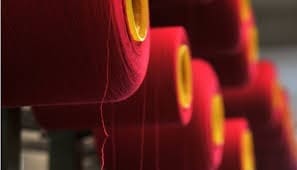New Delhi, Tuesday, 19th January 2021: The Parliamentary Standing Committee on Labour chaired by Shri Bhartruhari Mahtab, including Hon’ble Members of Parliament, Shri Subbarayan (Tirupur) and Shri Shanmugam (Rajya Sabha) visited Coimbatore and Tirupur on 19th January 2021 to study the potential for the growth of MMF textile industry in Tamilnadu. The Committee had an interaction with the National Committee on Textiles & Clothing (NCTC), comprising of Confederation of Indian Textile Industry (CITI), Apparel Export Promotion Council (AEPC), The Cotton Textiles Export Promotion Council (TEXPROCIL), The Synthetic & Rayon Textiles Export Promotion Council (SRTEPC), Powerloom Development & Export Promotion Council (PDEXCIL), Indian Technical Textile Association (ITTA) and Tirupur Exporters’ Association (TEA).
Shri Sanjay Sharan, Joint Secretary, Shri J. Karan Singh, Trade Advisor, Ms. Roop Rashi, Textile Commissioner and other officials from Ministry of Textiles, Shri Narendra Kumar Santhoshi, DDG, Ministry of Chemicals and Fertilizers, Government of India and Shri Shambhu Kallolikar, Principal Secretary, Handlooms & Textiles Department and Dr. M. Karunakaran, Director of Handlooms & Textiles and other officials from the Department of Handlooms and Textiles, Shri Vallalar, Commissioner of Labour and other officials from Department of Labour, and also officials from PPF, ESI, DISH from Government of Tamilnadu participated in the meeting.
Shri T. Rajkumar, Coordinator, NCTC and Dr. A. Sakthivel, Chairman, AEPC informed the Standing Committee on Labour that Tamilnadu being the largest textile manufacturing State accounting 1/3rd of the textile business of the Nation, housed with excellent infrastructure and eco-system for innovation and manufacturing of high value added manmade fibre textiles, there is a tremendous potential for attracting new investments including FDI / JVs and creating new jobs for several lakhs of people. Dr. A. Sakthivel, Chairman, AEPC, Shri Ashwin Chandran, Chairman, SIMA and also representing TEXPROCIL and SRTEPC, Shri M. A. Ramasamy, Chairman, PDEXCIL, Dr. S. K. Sundararaman, Chairman, ITTA and Shri Raja M. Shanmugam, Chairman, TEA interacted with the Standing Committee.
Since India, particularly Tamilnadu has reached saturation in the manufacture of cotton textiles and clothing products, there is a tremendous scope for India to grab the opportunities thrown by China especially in the post-Covid-19 scenario, if a conducive policy is announced for man-made fibre textiles and clothing products by facilitating a level playing field in the globalized environment. As India accounts for only 2.2% of the global MMF textile trade, the Ministry of Textiles has proposed a Focus Product Incentive Scheme for 40 HS lines of MMF Garments and 10 HS lines of Technical Textiles under the Production Linked Incentive Scheme recently announced by the Central Government. The global trade of these 50 HS line products is around US$ 222 billion and the existing share of India is very dismal.
NCTC stated that the anti-dumping duty and customs duty protection given for the domestic manufacturers and 18% GST on manmade fibres and 12% GST on MMF yarn have been curtailing the growth of the MMF Sector in India. India could not import even speciality fibres that are not manufactured in the country under nil duty. These MMF raw materials are produced by a very few manufacturers. Cotton produced by over 6 million farmers does not attract any duty and made available cheaper than the international price. MMF is expensive upto 23%. Therefore, NCTC appealed to the Standing Committee on Labour to recommend removing anti-dumping duty and also slotting the entire MMF value chain under 5% GST rate on par with cotton value chain apart from addressing inverted duty structure issues at processing and capital goods. Based on the representation made by NCTC, the Hon’ble Prime Minister, Shri Narendra Modi Ji has already removed the ADD on PTA, Acrylic Fibre and rejected the proposed ADD on PSF and MEG, thus enabling global competitiveness for the polyester segment while the removal of ADD on VSF is under active consideration.
Since the new Labour Codes would be implemented shortly, NCTC sought certain amendments in the new Codes to ensure Ease of Doing Business. Fixing uniform minimum wages across the country for all trades / job roles is essential to create a level playing field. There is a huge variation in the rates of minimum wages between States and also between trades / job roles within the State. NCTC also appealed to the Standing Committee on Labour to advise State Governments to avoid applying Juvenile Justice Act that defines the child labour as 18 years below while Factories Act permits employment of adolescent workers aged between 16 and 18 subject to certain conditions. NCTC further appealed to the Standing Committee to curtail the harassment of NGOs especially the textile clusters in Tamilnadu and tarnishing the image of the Nation in the global market. NCTC stated that Tamilnadu textiles & clothing industry pays highest wages rates and better welfare facilities to the workers. This is evident from millions of migrant workers coming to Tamilnadu from different parts of the country and employed in the State.
The officials from the Ministry of Textiles briefed about the various schemes and recommendations made by the Ministry to facilitate global competitiveness and enhance MMF production in the country. The Principal Secretary, Handlooms & Textiles Department, Government of Tamilnadu briefed about the various schemes and efforts taken by Government of Tamilnadu to increase MMF manufacturing facilities in Tamilnadu and indicated that two mega textile parks are being planned under Mega Textile Parks. He added that the State would give major thrust for increasing technical textile production in the State. Regarding compliance of labour laws and industrial relations, the Committee was highly impressed after the interaction with the industry and the State government officials. The Standing Committee on Labour, Chairman, in his concluding remarks stated that the Committee would consider the recommendations made by the industry, make suitable recommendations so that Tamilnadu especially Tirupur and Coimbatore clusters would prosper in MMF textiles manufacturing.

